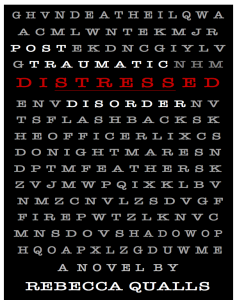
Flashbacks.
Last weekend David and I were sitting on the couch watching the 49‘s game. One minute our team is winning, the next minute an innocent commercial rips through the comfort of our home.
The commercial depicts a boy with tire tread running the length of his body, meant to invoke laugher and jollity. Instead the images unleash distress and horror.
Next to me, I feel David’s body tense. The steady rhythm of his breathing is replaced with a shortness of breath and in his eyes, tears pool around the edges, vying for freedom.
David sees something different.
The Secret Room.

To deal with and control these memories David goes to a secret place. A room designed specifically by him to provide safety and comfort. At one end sits a well used, worn brown leather chair. A coffee table stands in front of the chair and beyond the table, on the opposite wall, a fire in the hearth burns bright and warm. A focal point where light and heat bring tranquility and a feeling of security.
Both adjacent walls are lined with bookshelves containing volumes, magic anthologies, a documentation of events. Not just words but images, emotions, sounds and smells.
A Flashback.
Without warning, a book appears on the coffee table. And into the quiet room, the memory of a young boy with tire tread across his chest invades the safety and tranquility. Sights, a pool of blood puddles under his small head like a pillow. Sounds, the mournful shriek of a heartbroken mother who lost a piece of her heart in an instant. Smells, fresh blood creeping across black hot asphalt.
Unannounced and unavoidable, the unwanted remembrances float out of the open book and invade the secure, hidden space. Like rogue enemies, they launch poisonous arrows into the warm air and pierce the serenity.
David’s body tenses. His breath suspended in constricted lungs begging for escape, guarding a prayerful hope that the book will disappear.
But these are memories that will never go away. To contain and control them David has placed each one into a book. The memory of the little boy killed by a drunk driver is just one of many. David leans forward and closes the book. With a deep breath, he rises from his chair, picks up the book and places it back on the shelf in its rightful place. Tucked away, surrounded by a myriad of other memories, both fond and equally horrifying.
While flashbacks cannot be anticipated or avoided, they can be controlled. David’s use of a room full of his memories has worked for him. Memories are impervious to destruction but they can be coerced. Forced back into storage. Driven back into the past, leaving room for the light and warmth to occupy the present and bring peace again to the secret room.
Healing and tomorrow.
Our connection to the events of our past is a two way street. We may mosey down the avenue and revisit joyful occasions. And, just as easily, the past can barrel down the road and crash into our present, bringing remembrances we would care to forget.
But we are not left powerless. David learned this technique at a retreat for first responders. The West Coast Post-Trauma Retreat Center. (www.wcpr2001.org) The past cannot be changed. But for those suffering under the weight of bygone memories there is hope. And hope is the fire burning in the secret room, giving warmth and security and a chance to live fully in the present.
************
Check out Rebecca’s debut novel, DISTRESSED, on Amazon.
